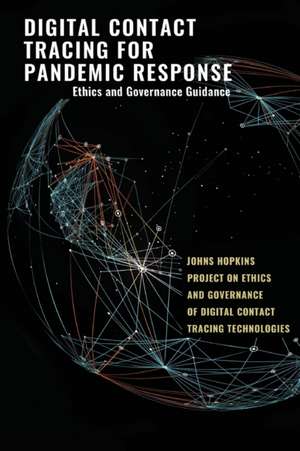Digital Contact Tracing for Pandemic Response – Ethics and Governance Guidance
Autor Jeffrey P. Kahn, Johns Hopkins P Johns Hopkins Pen Limba Engleză Paperback – 17 iun 2020
As public health professionals around the world work tirelessly to respond to the COVID-19 pandemic, it is clear that traditional methods of contact tracing need to be augmented in order to help address a public health crisis of unprecedented scope. Innovators worldwide are racing to develop and implement novel public-facing technology solutions, including digital contact tracing technology. These technological products may aid public health surveillance and containment strategies for this pandemic and become part of the larger toolbox for future infectious outbreak prevention and control.
As technology evolves in an effort to meet our current moment, Johns Hopkins Project on Ethics and Governance of Digital Contact Tracing Technologies--a rapid research and expert consensus group effort led by Dr. Jeffrey P. Kahn of the Johns Hopkins Berman Institute of Bioethics in collaboration with the university's Center for Health Security--carried out an in-depth analysis of the technology and the issues it raises. Drawing on this analysis, they produced a report that includes detailed recommendations for technology companies, policymakers, institutions, employers, and the public. The project brings together perspectives from bioethics, health security, public health, technology development, engineering, public policy, and law to wrestle with the complex interactions of the many facets of the technology and its applications.
This team of experts from Johns Hopkins University and other world-renowned institutions has crafted clear and detailed guidelines to help manage the creation, implementation, and application of digital contact tracing. Digital Contact Tracing for Pandemic Response is the essential resource for this fast-moving crisis.
Contributors: Joseph Ali, JD; Anne Barnhill, PhD; Anita Cicero, JD; Katelyn Esmonde, PhD; Amelia Hood, MA; Brian Hutler, Phd, JD; Jeffrey P. Kahn, PhD, MPH; Alan Regenberg, MBE; Crystal Watson, DrPH, MPH; Matthew Watson; Robert Califf, MD, MACC; Ruth Faden, PhD, MPH; Divya Hosangadi, MSPH; Nancy Kass, ScD; Alain Labrique, PhD, MHS, MS; Deven McGraw, JD, MPH, LLM; Michelle Mello, JD, PhD; Michael Parker, BEd (Hons), MA, PhD; Stephen Ruckman, JD, MSc, MAR; Lainie Rutkow, JD, MPH, PhD; Josh Sharfstein, MD; Jeremy Sugarman, MD, MPH, MA; Eric Toner, MD; Mar Trotochaud, MSPH; Effy Vayena, PhD; Tal Zarsky, JSD, LLM, LLB
Preț: 108.66 lei
Preț vechi: 114.39 lei
-5% Nou
20.79€ • 21.77$ • 17.20£
Carte tipărită la comandă
Livrare economică 05-19 aprilie
Specificații
ISBN-10: 142144061X
Pagini: 160
Dimensiuni: 163 x 229 x 9 mm
Greutate: 0.22 kg
Editura: Johns Hopkins University Press
Descriere
As public health professionals around the world work tirelessly to respond to the COVID-19 pandemic, it is clear that traditional methods of contact tracing need to be augmented in order to help address a public health crisis of unprecedented scope. Innovators worldwide are racing to develop and implement novel public-facing technology solutions, including digital contact tracing technology. These technological products may aid public health surveillance and containment strategies for this pandemic and become part of the larger toolbox for future infectious outbreak prevention and control.
As technology evolves in an effort to meet our current moment, Johns Hopkins Project on Ethics and Governance of Digital Contact Tracing Technologies-a rapid research and expert consensus group effort led by Dr. Jeffrey P. Kahn of the Johns Hopkins Berman Institute of Bioethics in collaboration with the university's Center for Health Security-carried out an in-depth analysis of the technology and the issues it raises.
Drawing on this analysis, they produced a report that includes detailed recommendations for technology companies, policymakers, institutions, employers, and the public. The project brings together perspectives from bioethics, health security, public health, technology development, engineering, public policy, and law to wrestle with the complex interactions of the many facets of the technology and its applications. This team of experts from Johns Hopkins University and other world-renowned institutions has crafted clear and detailed guidelines to help manage the creation, implementation, and application of digital contact tracing.
Digital Contact Tracing for Pandemic Response is the essential resource for this fast-moving crisis. Contributors: Joseph Ali, JD; Anne Barnhill, PhD; Anita Cicero, JD; Katelyn Esmonde, PhD; Amelia Hood, MA; Brian Hutler, Phd, JD; Jeffrey P. Kahn, PhD, MPH; Alan Regenberg, MBE; Crystal Watson, DrPH, MPH; Matthew Watson; Robert Califf, MD, MACC; Ruth Faden, PhD, MPH; Divya Hosangadi, MSPH; Nancy Kass, ScD; Alain Labrique, PhD, MHS, MS; Deven McGraw, JD, MPH, LLM; Michelle Mello, JD, PhD; Michael Parker, BEd (Hons), MA, PhD; Stephen Ruckman, JD, MSc, MAR; Lainie Rutkow, JD, MPH, PhD; Josh Sharfstein, MD; Jeremy Sugarman, MD, MPH, MA; Eric Toner, MD; Mar Trotochaud, MSPH; Effy Vayena, PhD; Tal Zarsky, JSD, LLM, LLB
Notă biografică
Johns Hopkins Project on Ethics and Governance of Digital Contact Tracing Technologies is a rapid research and expert consensus group effort led by the Berman Institute of Bioethics in collaboration with the Center for Health Security at Johns Hopkins University. It draws on experts from both inside and outside Johns Hopkins in bioethics, health security, public health, technology development, engineering, public policy, and law. Jeffrey P. Kahn, PhD, MPH, is the Andreas C. Dracopoulos Director of the Johns Hopkins Berman Institute of Bioethics. He is also the Levi Professor of Bioethics and Public Policy there, as well as a professor in the Department of Health Policy and Management at the Johns Hopkins University Bloomberg School of Public Health. His research interests include the ethics of research, ethics and public health, and ethics and emerging biomedical technologies. He speaks widely both in the United States and abroad, and has published four books and over 125 articles in the academic literature. He is an elected member of the National Academy of Medicine and a fellow of the Hastings Center, and he has chaired or served on committees and panels for the National Institutes of Health, the Centers for Disease Control and Prevention, and the National Academy of Medicine (NAM), where he is currently the chair of the Board on Health Sciences Policy and a member of the NAM Council. His education includes a BA in microbiology (University of California-Los Angeles, 1983), an MPH (Johns Hopkins University, 1988), and a PhD in philosophy (Georgetown University, 1989).
























